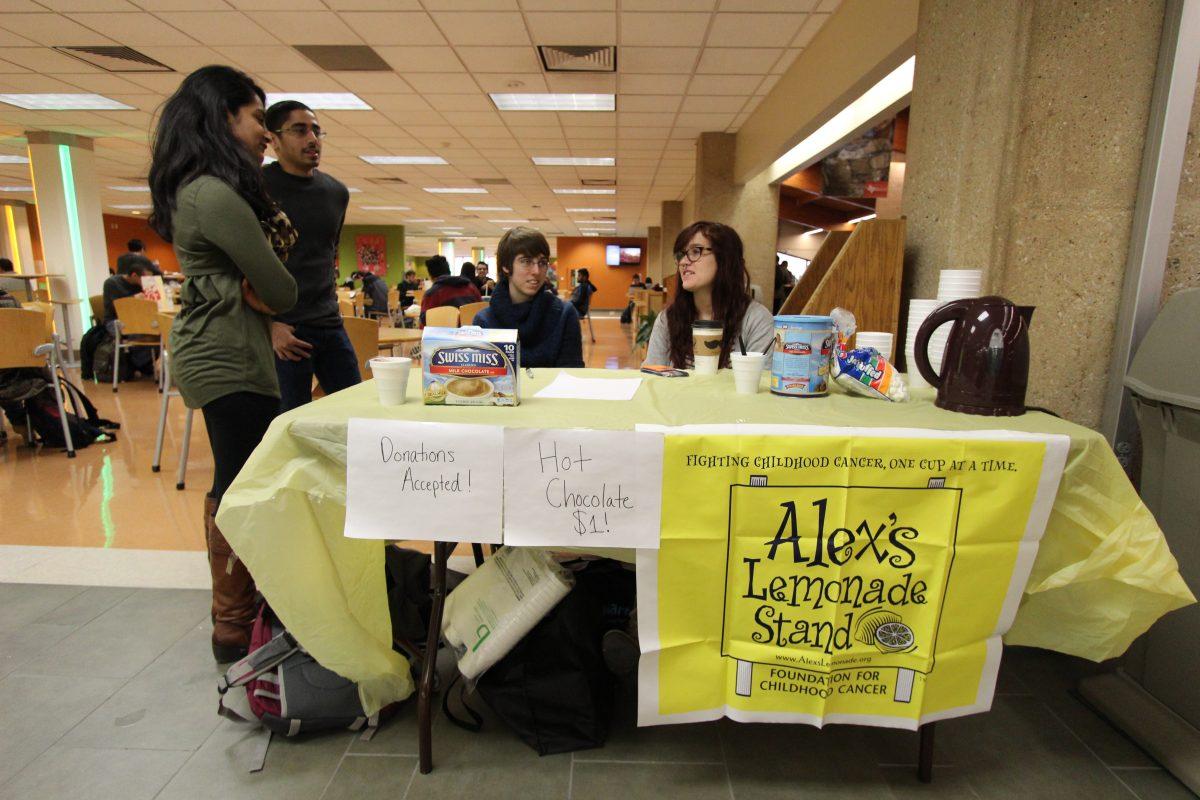Members with, without history of disease show compassion
A group of students is using an out-of-the-box method to help the fight against cancer — lemonade.
Usman Hyder, molecular biology sophomore, became interested in taking part in that fight last year.
“I wanted to be an oncologist, so that’s where my interest came from,” Hyder said. “I was interested in cancer in the first place, so this was a good way to get to know more and support the field I wanted to join.”
Since its creation, the Lemon Club has raised over $1,200 dollars through fundraising alone. The club holds monthly lemonade stands on campus to raise money for the cause. During the colder months, they serve hot chocolate.
“We’re selling hot chocolate for $1 and hopefully it will warm up the students and also raise awareness about this organization,” said Sharon Chang, a neuroscience sophomore and the secretary of the Lemon Club. “Students will have the opportunity to donate and help out with the cause.”
The club chose Alex’s Lemonade Stand Foundation to be its focus because of the story behind it. Alex was a young girl from Connecticut diagnosed with neuroblastoma when she was 1 year old.
In 2000, Alex turned four and opened her first lemonade stand to help raise money for other children like her. Within four years, she raised over $1 million through donations.
She passed away when she was 8 years old, but her parents carried on her legacy by creating the foundation in 2005 to continue to help other children affected by cancer.
Although Hyder is no longer planning to become an oncologist, he is still passionate about finding a cure for cancer. His club donates all of their earnings to ALSF, an organization that provides grants for pediatric cancer research.
“I chose this organization in particular (because) pediatric research isn’t nearly as funded as the prevalence of it in society,” he said. “It doesn’t have nearly the amount of funding as adult cancer like breast cancer and pancreatic cancer.”
According to the American Childhood Cancer Organization, pediatric cancer research doesn’t receive as much funding as other types of cancer research, despite being the primary cause of death in children under the age of 15.
Pediatric cancer research receives $180 million from the ACCO annually, while other projects — such as breast cancer research — receive over $500 million.
In an attempt to reconcile this difference, organizations like ALSF provide grants to researchers who focus on pediatric cancer. Since 2005, ALSF has raised over $120 million and sponsored 550 research projects to find new treatments and remedies for pediatric cancer.
Biochemistry sophomore Thomas Howlett, a member of the Lemon Club, learned about ALSF through his own experience with pediatric cancer five years ago. He was diagnosed with acute myeloid leukemia, a rare blood cancer that affects bone marrow.
Although his treatment only lasted five months, his immune system weakened due to the bone marrow transplant. Howlett had to be isolated for over a year.
“Since it’s a brand new immune system, you can’t go out into public so they slowly reintroduce you back,” he said. “At the very beginning, friends and family can’t see you and pretty much the only place I could go is to the hospital.”
Since his remission, Howlett has had a different perspective on and appreciation for life. He said wants to give back to pediatric cancer research in any way he can.
“I know that I want to give back to cancer in general, but specifically pediatric because it is under represented. Even the research is lacking,” he said.
Howlett helps with bone marrow donation organizations and fundraising for pediatric cancer research as often as he can. He admires the members of the Lemon Club because of their devotion — even though most members haven’t personally experienced pediatric cancer.
“I think it’s really cool to get behind the cause without even having a connection to it,” he said.
The Lemon Club will run its next hot chocolate stand on Feb. 10 and will sell Valentine’s Day grams. It’s also planning a talent show on Feb. 26 from 7 to 9 p.m.
“I think it is a really cool event for people who might be interested in the club or want to demonstrate their talent,” Chang said. “It’s a really cool way for people to come together to learn about the club.”
Their annual Lemon Mile Run is on March 31. Participants run a mile around campus to raise money and awareness for pediatric cancer.
Chang said that the run last year was successful and she hopes this year’s will be even better.
“Our club made t-shirts, so seeing the people in those t-shirts and seeing (that) we’re all involved in the same cause felt really good,” she said.
This semester, the Lemon Club hopes to raise the largest amount of money since their creation. It aims to collect over $1,500 through the lemonade stands, the talent show and the Lemon Mile Run.
Hyder anticipates that working with these organizations will help them raise more money for pediatric cancer research.
“We’re working on coordinating with a few other organizations to make more events,” Hyder said. “So we do have a lot going on this semester and we do hope to raise a lot of money.”







